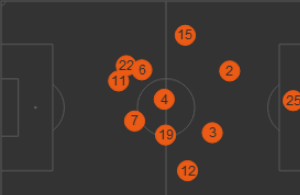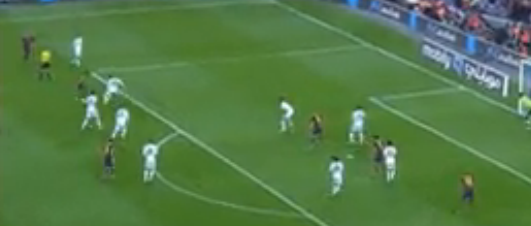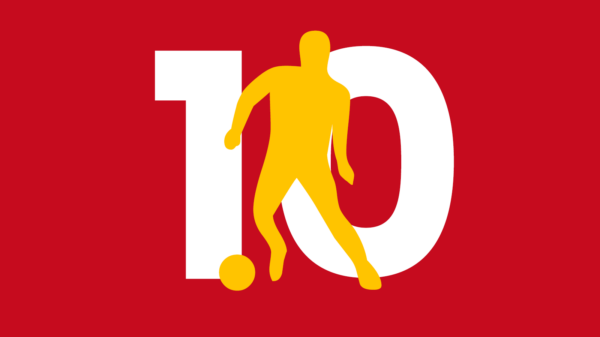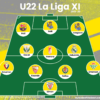Despite the Premier League being the “global league” in terms of visibility and a hold on the football market in numerous countries, there’s one game that supersedes all of the Premier League games. That of course is none other than ‘El Clasico’, the highly charged game between Barcelona and Real Madrid.
From severed pig heads to eye pokes (yes Mourinho, we still remember that one) this fixture has a knack of producing high and sometimes downright bizarre drama. In between all the political undercurrents of this fixture, there is some scarily good football that is on show when the 2 sides battle it out.

Created via our very own Tactics Creator. Click here to try it!
The Barcelona team lined up as expected in a 4-3-3 with Fabregas playing as a false 9 flanked on either side by Messi and Neymar. Adriano filled in at left back. On the other hand, Ancelotti’s team lined up with a couple of changes that not many would have predicted. Benzema was dropped to the bench and Morata didn’t even figure on the bench. Instead Ancelotti opted for a fluid 3 man attack of Di Maria, Ronaldo and Bale. In midfield, Sergio Ramos was the surprise inclusion alongside Modric and Khedira.
MADRID’S DEFENSIVE SET-UP
With the game being at Nou Camp, you’d expect Real to sit back and absorb the pressure and hit Barca on the counter. When Barca had the ball, it was a common sight to see the Madrid back 4 pinned back deep within their own half. Another notable feature was that the midfield trio were often joined by 1 of the 3 attacking players when Barcelona was in position leaving the remaining 2 players higher up the pitch. This in essence created 2 banks of 4 (used so effectively by Chelsea to contain Barca a couple of years back) and was supposed to provide both defensive solidity and a threat on the counter using the pace of Ronaldo and Bale. Unfortunately for a Madrid point of view, neither aim materialized in a disappointing 1st half.
BARCELONA GETTING BEHIND THE OPPOSITION DEFENCE
Seeing that the Real defence was intent on sitting deep, Barcelona were willing to be patient and bide their time. In the trio of Busquets, Xavi and Iniesta, Barca boast of 3 of the most accomplished passers in Europe. Thus, they slowly drew the Real Madrid out and then played their hand. And once they did so, their attacking players, especially Neymar who posed the most danger to the away side in the 1st half. Neymar came up against highly rated young full back Daniel Carvajal (we picked him as number 1 in our list of Top 10 Young La Liga Plyers to watch out for) and served as the focal point of the attack. The Brazilian was constantly the highest Barcelona player on the pitch in terms of position always ready to make runs in behind the defence thus providing penetration to the attacks. And if you have a player of the calibre of Iniesta in the side, then you can be rest assured that he’ll pick out a fair number of the total runs made. It came as no surprise that Neymar’s goal came about when he was the furthest person forward.
Football Blogging Awards: Click here and vote for us in the “Best New Football Blog” Category
This was a recurring theme throughout the game. Messi from the right was another good example of how Barca relied on the attackers to make runs in behind the defence. Barcelona eked out a number of good chances through this tactic. The 2nd half continued along the same vein and Neymar had a chance to add to his tally before Alexis Sanchez got the all important 2nd goal after a run in behind the defence.
FAILURE OF MADRID’S ATTACK AND RONALDO’S POSITION

Cristiano Ronaldo’s (Number 7) position over the 90 minutes via whoscored.com
As already mentioned before, Real Madrid set up with 3 attacking players in the form of Cristiano Ronaldo, Gareth Bale and Angel Di Maria who formed a dynamic front 3 with lots of interchangeability. In theory, this interchangeability coupled with the considerable pace at their disposal would make them a threat from counter attacks. But it wasn’t to be. Retrospect is a wonderful thing but one can’t help but wonder why Ancelotti simply didn’t start Ronaldo in his preferred left role and Di Maria on the right flanking a central striker. The Portuguese International had a quiet game by his astronomically high standards. Having said that, almost all of his positive contributions to the game were from a wider position on the left, especially the inside left channel. It was from this side that he created a great opportunity for Khedira on the stroke of half time and of course his assist for Jese’s consolation goal from the inside left channel in addition to a shot that Valdes did well to get a strong hand on.
CHANGE OF APPROACH AFTER HALF TIME
There was a visible change in both the teams’ approach after the half time break. It was Barcelona’s turn to sit deep when not in possession which made them hard to break down and also made them more dangerous from the counter.

Barcelona’s action areas between 45-70 minutes via squawka.com
This is where Martino did well. There were bound to few raised eyebrows when Iniesta was replaced by a more defensive minded Song but the Barca manager had already brought Alexis Sanchez on for Fabregas thus making his defence more solid while at the same time strengthening the counter attacking ability of his team. This paid dividends as Sanchez scored what was the eventual winner with a delightful chipped finish.
A direct consequence of Barcelona holding a deeper line was of course that Real Madrid as a team moved a few yards up the pitch. Illaramendi replaced an unimpressive Ramos and Benzema was thrown on by Ancelotti in search of an equalizer. Contrary to in the first half, Real now stuck to a more conventional 4-3-3 formation.
CONCLUSION
The latest installment of ‘El Clasico’ was hardly a Messi vs Ronaldo affair as we’ve come to expect from the 2. Instead it was a case of the battle between the Clasico virgins. Neymar’s impressive performance most definitely trumped Bale’s uninspired showing and Martino won the tactical battle with Ancelotti. Ancelotti will point to luck and the fact that his side was denied a clear penalty on Ronaldo but at the end of the day, he’ll have to accept that on the day he and his team were 2nd best.
Did you notice a tactical snippet that we missed? If so do leave a comment below. Make sure you follow us on Twitter @OOTB_football and like us on Facebook. We’re on Google+ and Tumblr as well for those interested.
CLICK HERE TO READ OUR OTHER TACTICAL ANALYSES
- Deconstructing the Perfect Counter-Attack - June 19, 2020
- The Battle For Indian Football’s Soul - May 19, 2020
- Bengaluru FC 2-1 FC Goa | Gritty Blues eke out an important win - January 6, 2020




























































